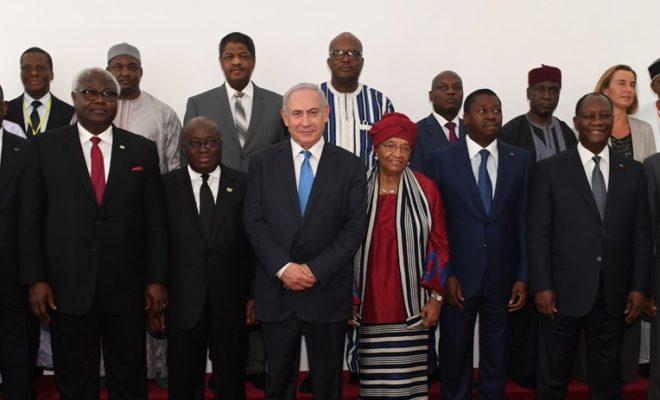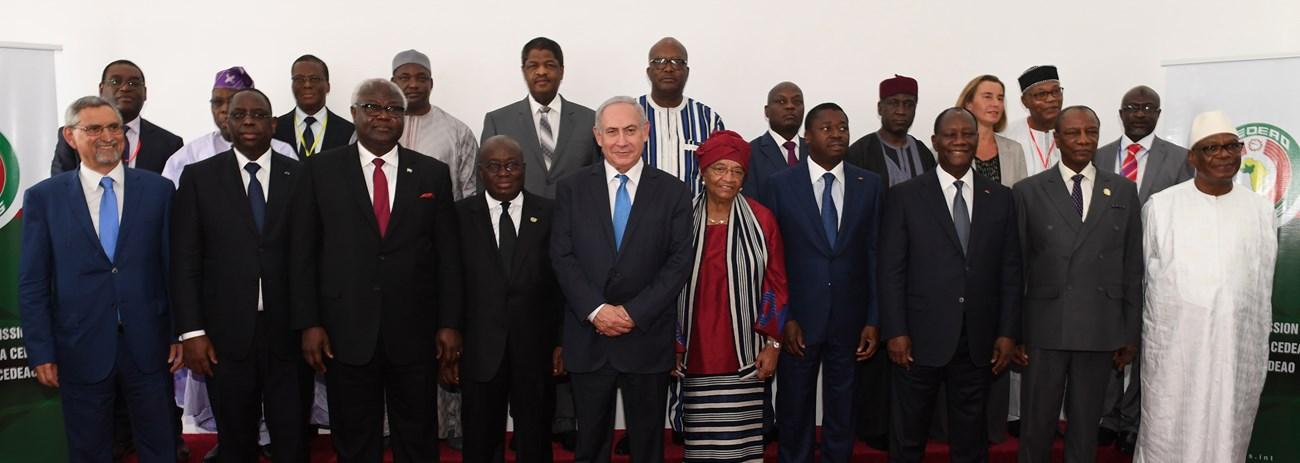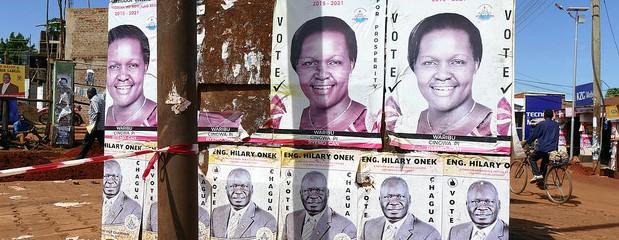Call it a comeback: Israel’s grand “return” to Africa

In exchange for development support, Israel wants African votes at international forums. This may prove trickier than it thinks.

Israel’s PM Benjamin Netanyahu with West African heads of state at the ECOWAS summit in June 2017. Credit: Israel Government Press Office.
This June, Israel’s Prime Minister Benjamin Netanyahu broke new ground as he became the first non-African leader to speak at the Economic Community of West African States (ECOWAS) summit. During his speech in Monrovia, he declared once again that “Israel is coming back to Africa”.
This mantra is not just hot air. Israel is making considerable efforts to strengthen its relations with the continent. A year ago, Netanyahu became the first Israeli PM to visit Africa in decades as he travelled to Uganda, Kenya, Rwanda and Ethiopia. Since 2016, at least nine African heads of state have visited Israel.
[Netanyahu’s East Africa tour and Israel’s secret aid-for-asylum-seekers scheme]
Now, preparations are underway for the Africa-Israel Summit that will take place in Togo this October. It is unclear how many African heads of state will attend, but the organisers say they hope 25-30 will show up.
Israel’s first “African adventure”
Netanyahu’s vow that Israel is “coming back” to Africa is a reference to the thriving relations of the 1960s. In that period of African independence, Israel established relationships with over 30 countries and offered them technical assistance in fields from security and military training to agriculture, urban planning, education and health. Independent since 1948, Israel positioned itself as a model for successful post-colonial modernisation and as a provider of the solutions, skills and technologies that younger African nations lacked.
Israel’s engagement was largely driven by the need to gain support at the UN and curb Arab influence. For example, Israel made sure to maintain strong ties with Kenya and Uganda, while providing significant military support to Ethiopia and, more briefly, to southern Sudanese rebels. By establishing a presence in countries in the Horn and East Africa, it strategically surrounded its Arab enemies.
But these close relations weren’t to last. Following the 1967 Six Day War – in which Israel captured neighbouring territories, including Egypt’s Sinai Peninsula – relations began to slow down. In 1972, under Arab pressure and fearing African disunity, African states began severing ties with Israel.
By late-1973, Israel’s first “African adventure” – as it was described by Israel’s Foreign Minister and later Prime Minister Golda Meir – had come to an end.
Development in return for UN votes
Netanyahu’s references to a bygone era of Israeli-African relations may contain a hint of nostalgia. But there are also clear parallels between then and now.
Like 50 years ago, Israel is positioning itself once again as the provider of solutions to African problems. No Israeli-African press conference is complete without several references to security, technology and agriculture – all fields in which Israel can supposedly assist the continent. Military technologies often attract much attention in this context, being some of the most famous and sought after “solutions” Israel advertises when it goes to Africa.
Similarly, the main objective of Israel’s return to Africa is – as it was in the 1960s – diplomatic support in its disputes with its Arab neighbours. Israel promises economic opportunities, technologies and development. In return, it expects African leaders to support it at international forums.
As Netanyahu explained in a meeting with Israel’s ambassadors to African countries earlier this year: “The first interest is to dramatically change the situation regarding African votes at the UN and other international bodies from opposition to support.”
Netanyahu has also made this appeal directly to African leaders in both Israel and Africa, including at the ECOWAS summit. “I ask for your support in rejecting anti-Israel bias at the United Nations and in bodies such as the General Assembly, UNESCO and the Human Rights Council,” he said.
Small victories, greater expectations
Israel is seeking diplomatic support from African states as its old allies, the US and Europe, are slowly becoming impatient with its right-wing leadership and its manifested lack of interest in ending the occupation of Palestine. In this context, the need for Israel to improve its diplomatic relations with African countries has become clear.
Last December, Senegal was one of the sponsors of a historic UN Security Council resolution declaring Israeli settlements in the West Bank, Gaza Strip, and East Jerusalem illegal. Angola, which was also a non-permanent member of the Council at the time, voted in favour.
To Israel’s embarrassment, Senegal co-sponsored the resolution even though President Macky Sall met Netanyahu only three months earlier in New York. Netanyahu had proudly remarked that the two countries have “great relations”.
Following the UN resolution, Israel cancelled its aid programmes in the two African countries and recalled its ambassador to Senegal. Ties with the latter were mended in June, however, when Sall and Netanyahu met again on the side-lines of the ECOWAS summit.
It remains to be seen whether Senegal will now adopt a more pro-Israel position, but Jerusalem undoubtedly expects it to do so. Along with Senegal, which is still a non-permanent member of the Security Council, Ethiopia now also has a seat in the chamber. Ethiopia is one of Israel’s closest allies in Africa.
Israel has also faced diplomatic battles at other international forums. Earlier this year, for example, UNESCO’s executive board put forward a resolution criticising Israel’s actions in Jerusalem. Although the resolution passed, Israel saw it as a victory that several countries, including Togo, changed their positions to vote against it.
The limits of African support
Israel’s re-engagement on the continent has yielded some successes, but not everyone has succumbed to its charm offensive. Last year, Nigeria’s President Buhari reportedly blocked Israel from participating in the ECOWAS summit. When Netanyahu was invited to 2017 edition, the leaders of Nigeria, Benin, Niger and Morocco chose not to attend. Morocco’s King Mohammed VI explicitly cancelled his participation because of Israeli PM’s presence, but the others did not give a reason.
Israel is also clearly focusing on East and West Africa in its efforts. In southern Africa, where memories of apartheid and Israel’s support for it are fresher, the country is still less welcome. The same is true in North Africa. It was somewhat symbolic that Netanyahu’s flight from Tel-Aviv to Monrovia in June took about 12 hours because several North African countries do not allow Israeli planes to travel through their airspace.
Looking ahead, Israel may well present its “return” to Africa as a grand success. However, it may find that even seemingly amenable countries are more reluctant than it hopes. While African governments may not explicitly dismiss Israel’s requests for diplomatic support, they will have to balance these demands with local and regional commitments to populations and states that are more critical of Israel.
The support Israel gets from Africa may prove invaluable at points, but it will take different forms in different countries and, in many cases, is likely to remain ambivalent or unstable. It will also not be able to substitute – at least in the foreseeable future – the massive material and diplomatic backing Israel still gets from the US.
Whatever extra diplomatic support Israel manages to get from Africa, however, the worse it is for Palestinians. Netanyahu’s speech at the ECOWAS summit took place on the eve of the 50th anniversary of the Six-Day War, and thus, the 50th anniversary of Israel’s occupation of the West Bank and Gaza Strip. The more international support the Israeli government finds, the less likely it is to bring this occupation to an end.







Yotam Gidron is an Israeli lib posing as an objective reporter. He pulls out the same false “postulate” that “the more international support the Israeli government finds, the less likely it is to bring this occupation to an end”, which is just his opinion, not fact.
In fact, after the very pro-Israel, pro-Netanyahu presidential candidate Donald Trump won the election, Palestinian President Abbas made very positive overtures for peace.
Israel is slowing disappearing as the international boogeyman the arabs created at the UN, especially now that the Middle East is crumbling without Israeli involvement.
Israel is a sovereign Nation and has the right as others have. No time is late for it to build back its relation with African Nations; this is not negotiable as I will like African Nations to understand the importance of Israel in our economic development. We have a lot to learn from the Israelis Government and people. For every good road to development, you need Nations, people, and knowledge. I see Israel as a nation that has stood firm for economic development of all, I see Israel as a Nation with peace in mind , a Nation that would give you good opportunity to develop and reach out to others, African Nations should remove sentiments and think about Africa in the next 50 years to come, that is how Israel people think, I see the coming of the Prime Minister of Israel Benjamin Netanyahu as a great entry for the economic success of the African Nations we should remove politics and sentiments and see Israel as a Nation that has good mind for others. I have long awaited this entry, I will promote this as Africa has suffered so much due to Bad leadership and wrong decisions, I encourage all the Heads of Governments in Ecowas to embrace this Olive branch of economic integration, a relationship that will give hope for all, clean spirit without deceit is what they give, I have never seen more of Israelis product in West Africa, for the prime Minister to have made it here, please my deal African leaders, see this as the beginning of our development in full economic independence. I will specifically ask My Government of Nigeria to take advantage of this opportunity and fine tone its relationship with the Nation of Israel. I also use this opportunity to ask the Nation of Israel not to give up on us and forgive us of all areas we have ignored the principle of good friendship at the United Nations. I ask the prime minister to come with a full economic team from Israel and open all areas of cooperation as friends and allies once again.
GOD BLESS ISRAEL
GOD BLESS WEST AFRICA
If Israel makes a grand comeback to west Africa, this will mean the end of friendly relationships with Southern Africa (by the way, Southern Africa is not a country, it consists of Zambia, Tanzania, Namibia,Botswana, Zimbabwe, Lesohto, Swaziland,and South Africa, Angola ect.) and in turn the SADC. South Africa will support their comrades in the struggle (Palestinians) and pull out any military back up and economic programs in west Africa. It is often underestimated how important South Africa and its neighbors is to west Africa, economic programs, training programs, health programs and (since the SANDF (and other SADC countries) is a peacekeeping force that unlike other militaries does not get involved to win but to bring peace) this will be detrimental to stability and prosperity to Africa as we have to build Africa with Africa. Israel is an opressive regime that will split Africa apart and allow our independence as a continent be once again (first Europe, thereafter America, that China) undermined. Rather have bad relations with an opressive regime that is on,y interested in leeching of Africa than have bad relationships with most of the continent (especially African economic and military powers such as Egypt and South Africa and stable countries that assist development such as Namibia and Botswana)
I am from Vancouver,Canada and I wanted to say that there should be no collaboration by African countries with Israeli Apartheid.The Africa-Israel summit next October should be boycotted by all African countries.Any African country that goes to this summit should be condemned.This summit is an insult to all Palestinians.It is good that South Africa is boycotting this summit.South Africa knows what Apartheid is like.
[…] over a decade, Israel has lobbied hard for observer status at the AU, finding support in west, central and east […]